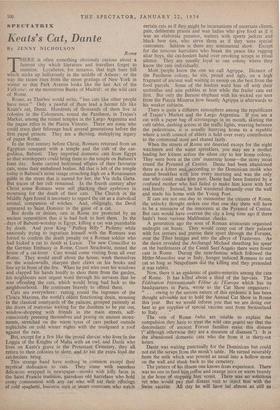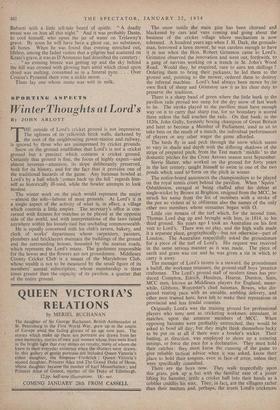SI'ECTATHIX
Keats's Cat, Dante
By JENNY NICHOLSON Rome THERE is often something obviously curious about a famous city which literature and travellers forget to mention. Lycabetus, for instance, that high bare hill which sticks up ludicrously in the middle of Athens: or the way the steam rises from the street gratings of New York in winter so that Park Avenue looks like the last Act of the Valkyrie: or the monstrous Banks of Madrid: or the wild cats of Rome.
Rome, as Thurber would write, " has cats like other 'people have mice." Only a pawful of .them lead a hermit life like Keats's cat, Dante. Hundreds of thousands of them live in colonies in the Colosseum, round the Pantheon, in Trajan's Market, among the ruined temples in the Largo Argentina and the pagan relics in the Piazza Vittorio. There are some who could trace their felineage back several generations before the first papal princes. They are a thriving, multiplying legacy of pagan Rome.
In the first century before Christ, Romans returned from an , Egyptian, conquest with a temple and the cult of the cat- goddess, Babusti. They imported domestic cats from Egypt so that worshippers could bring them to the temple on Babusti's feast day. Some carried bedizened effigies of their favourite cats, some their embalmed bodies. All that is left of the temple today is Babusti's stone image,crouching high on a Renaissance gable in the street that is named for her, the Via della Gatta. But traces of her cult remained. In the fourth century after Christ some Romans were still plucking their eyebrows in mourning for the death of their cats. The Church in the Middle Ages found it necessary to regard the cat as a diabolical animal, companion of witches. And, obligingly, the Devil appeared to Saint Dominic in the guise of a cat.
But devils or deities, cats in Rome are protected by an ancient superstition that it is bad luck to hurt them. In the days of Babusti-worship in Egypt, killing a cat was punishable by death. And poor King ' Puffing Billy " Ptolemy while anxiously trying to ingratiate himself with the Romans was forced to confirm the death penalty on a Roman soldier who had kicked a cat to death at Luxor. The new Councillor to the German Embassy in Rome, Count Strachwitz, rented the house of a cat-lover. Cats would come visiting from all over Rome. They would stroll about the house, wash themselves on the windowsills, sharpen their claws on his books and line up in front of the fire. When he put wire over his windows and clapped his hands loudly to shoo them from the garden, his neighbours sent urgent word through his servants that he was offending the cats, which would bring bad luck to the neighbourhood. He continues bravely to offend them.
Cats are everywhere: ratting round the ingresses of the Cloaca Maxima, the world's oldest functioning drain, mousing in the classical courtyards of the palaces, grouped patiently at the doors of trattorias waiting for the dustbins to be put out, window-shopping with friends in the main streets, self- consciously preening themselves and posing on ancient monu- ments, stretched on the warm "tyres of cars parked outside nightclubs on cold winter nights with the mudguard a roof against the rain. But, except for a few like the proud she-cat who lives-in the. Loggia of the Knights of Malta with an owl, and Dante who lives on Keats's grave in the Protestant Cemetery, they alL return to their colonies to ,sleep, and to eat the extra food the . cat-feeders bring. This strange band have nothing in common except their mystical dedication to cats. . They come with nameless delicacies wrapped in newspaper—monks with jolly . faces in. the Saint Francis traditicin, garrulous old harridans who hold crony communion. with . any cat- who . will eat. their .offerings: of cold spaghetti, business men in smart- overcoats who watch certain cats as if they might be incarnations of uncertain clients, pale, -deliberate priests and wan ladies who give food as if it was an elaborate penance, waiters with sports jackets and black bow ties, who serve them as if they were special customers. Seldom is there any sentimental show. Except for the raucous harridans who break the peace like ragging altar boys, the cat-feeders hand over revolting scraps in ritual silence. They are usually loyal to one colony where they know the cats individually.
Mok people know the one we call Agrippa. Dictator of the Pantheon colony, he sits, proud and ugly, on a high fragment of ancient wall waiting to swoop on the best from the food parcels. Some of the feeders ward him off with their umbrellas and aim pebbles at him while the frailer cats eat first. But only the Bernini elephant with his wicked eye sees from the Piazza Minerva how beastly Agrippa is afterwards to his weaker subjects, There is quite a different atmosphere among the republicans of Trajan's Market and the Largo Argentina. If you see a cat with a paper bag of scroungings in its mouth, skirting the café tables, dashing across at the traffic lights, weaving between the pedestrians, it is usually hurrying home to a republic where a swift council of elders is held over every contribution to the communal store and shared fairly. .
When the streets of Rome are deserted except for the night watchmen and the water sprinklers, you may see a mother leading her kittens across the silent city to her home colony. They were born at the cats' maternity home—the stony moat round the Pyramid of Cestius. Dante had been abandoned there as a kitten and, according to the Dominican monk who shared breakfast with him every morning and was the only one who could make him purr, Dante had been fostered by a confused mother who had failed to make him leave with her real family. Instead, he had wandered dreamily over the wall and made his home with the Young Poet.
If cats are not one day to outnumber the citizens of Rome, the unlucky thought strikes one that one day there will have to be a massacre of the innocents at the Pyramid of Cestius. But cats would have overrun the city a long time ago if there hadn't been various Malthusian checks.
A generation ago the sons of Roman aristocrats organised midnight cat hunts. They would creep out of their palaces with fox terriers and pursue their sport through the Forums, over the Tiber bridges and into the alleys of Trastevere. As the dawn revealed the Archangel Michael sheathing his spear on the battlements of the Castel Sant'Angelo there were fewer cats in Rome. During the near-famine which followed the Hitler-Mussolini war in Italy, hunger induced Romans to eat cat so long as Neapolitans did the killing and they pretended it was rabbit.
Now, there is an epidemic of gastro-enteritis among the cats of Rome. It has killed about a third of the lap-cats. The Federation Internationale Feline de l'Europe which has its headquarters in Paris, wrote to the Cat Show organisers: " . . .‘ owing to the serious nature of this epidemic it has been thought advisable not to hold the Annual Cat Show in Rome this year. But we would inform you that we are doing our best to get supplies of special vaccine sent from Switzerland to Italy. . . ." The vets of Rome (who are unable to explain the compulsion they have to treat the wild cats gratis) say that the descendants of ancient Forum families resist this disease ("although otherwise they are a museum of diseases"). It is the abandoned domestic cats who die from it in thirty-six hours.
Dante was waiting punctually for the Dominican but could . not eat the scraps from the monk's table. He turned miserably from the milk which was poured as usual into a hollow stone on the wall and slunk back to the cemetery.
The pattern of his illness one knows from experience. There was no one to feed him,coffee and orange juice or warm brandy in the hope of stopping ,hini vomit. • There was no solicitous vet who. would pay that distant,visit to inject him' with the Swiss vaccine.' All day be will have sat almost as still as Babusti with a little tell-tale beard of spittle. " A deadly sweat was on him all this night." And it was probably Dante, to cool himself, who upset the jar of water on Trelawny's grave. By noon he will have been a ghost cat, no substance, all bones. When he was found that evening stretched out, lifeless, among the faded violets that a pilgrim had scattered on Keats's grave, it was as D'Annunzio had described the cemetery : . . . " an evening breeze was getting up and the sky behind the hill was crossed with glowing bars amid which cloud upon cloud was melting, consumed as in a funeral pyre. . . . Over Cestius's Pyramid there rose a sickle moon. . . .
There lay one whose name was writ in milk.



































 Previous page
Previous page